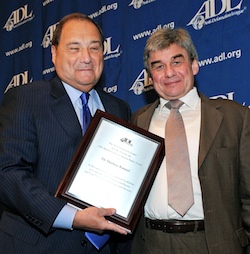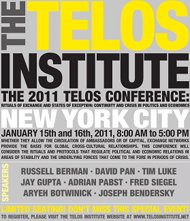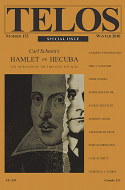Today marks the tenth anniversary of the destruction of the Bamiyan Buddhas in Afghanistan. What does this anniversary tell us about attacks on images in the post-Bamiyan world, and the relationship of these attacks to both religious and political conflict? In this brief piece, I will attempt to put the relationship into context, comparing events ten years ago in Bamiyan to other subsequent acts of Islamist image-breaking, and will ask whether such acts can be categorized as a singular type of contemporary iconoclasm, interpretable through the often-used label of “Wahhabism.”
|
In her 1963 book, On Revolution, Hannah Arendt wrote poignantly of the “revolutionary tradition and its lost treasure.” What was this trove of priceless gems and relics, with a noble pedigree few are aware of and without a name? Why was it lost? And what’s this got to do with the events of January-February 2011 in Egypt? Telos Press congratulates Matthias Küntzel on receiving the ADL Paul Ehrlich-Gunther K. Schwerin Human Rights Award. Below is a press release from the Anti-Defamation League announcing the award. Purchase Matthias Küntzel’s Jihad and Jew-Hatred: Islamism, Nazism and the Roots of 9/11 at our website and receive 10% off through the month of February. Dr. Matthias Küntzel was presented with the ADL Paul Ehrlich-Gunther K. Schwerin Human Rights Award during the League’s National Executive Committee meeting in Palm Beach, Florida. An earlier version of this essay was presented at the 2011 Telos Conference, “Rituals of Exchange and States of Exception: Continuity and Crisis in Politics and Economics.” “New evangelicals,”[1] perhaps unexpectedly for non-believers, offer a few ideas—interesting for their mix of market and common-good positions, and for an apparent paradox. “New evangelicals” work with a sophisticated notion of the common good—though their beliefs and practices rely on the very eighteenth-century principles that fostered unregulated market development. That is, they uphold unencumbered entrepreneurialism in markets, but this commitment makes them entrepreneurs for the benefit of others. This becomes more interesting when one considers that the “new evangelical” paradox has significant effect on the circulation of money and people worldwide. The material here is taken from field research that I did between 2005 and 2010 and which will appear in a book later in 2011 (Eerdmans Publishing). Timothy Wong’s “Steward of the Dying Voice: The Intrusion of Horatio into Sovereignty and Representation” appears in Telos 153 (Winter 2010). Read the full version at TELOS Online website. The following text was presented at the 2011 Telos Conference, “Rituals of Exchange and States of Exception: Continuity and Crisis in Politics and Economics.” (For the people of Tunisia.) |
||||
|
Telos Press Publishing · PO Box 811 · Candor, NY 13743 · Phone: 212-228-6479 Privacy Policy · Data Protection Copyright © 2025 Telos Press Publishing · All Rights Reserved |
||||
 Palm Beach, FL—A German political scientist and writer who has laid bare the genocidal intent of Iran’s nuclear program and exposed a link between the anti-Semitism of the Nazis and of the Iranian regime was honored today by the Anti-Defamation League (ADL) for his ongoing research in the roots and manifestations of modern Jew-hatred.
Palm Beach, FL—A German political scientist and writer who has laid bare the genocidal intent of Iran’s nuclear program and exposed a link between the anti-Semitism of the Nazis and of the Iranian regime was honored today by the Anti-Defamation League (ADL) for his ongoing research in the roots and manifestations of modern Jew-hatred.  In light of the 2008 global financial crisis, a reassessment of the global market system seems to be afoot. If neoliberalism (too much market) yields the Great Recession, if socialist planning (not enough market) produced the failed economies of the former Soviet bloc, and if social-market combinations (too much centralization of the market) progress towards the slow economic growth and high-cost programs of Western Europe, what are better options?
In light of the 2008 global financial crisis, a reassessment of the global market system seems to be afoot. If neoliberalism (too much market) yields the Great Recession, if socialist planning (not enough market) produced the failed economies of the former Soviet bloc, and if social-market combinations (too much centralization of the market) progress towards the slow economic growth and high-cost programs of Western Europe, what are better options?  This article examines the issue of early modern sovereign succession and political representation through the figure of Horatio. Using Carl Schmitt’s comments on the “dying voice” in the first appendix of Hamlet or Hecuba, and his theory of political representation, this essay argues that Horatio represents the transitional space between the fading vestiges of political theology, and the first traces constituent sovereignty. In his role as mediator of the sovereign word of King Hamlet and the dying voice of Prince Hamlet, Horatio becomes the proto-constituent subject who signals the genesis of a reoriented political agency that is constituted by popular consent rather than authoritarian rule. Furthermore, Horatio is the paradoxical representative that both represents the body politic (in the sense of the King’s two bodies) to the people and the popular will to itself.
This article examines the issue of early modern sovereign succession and political representation through the figure of Horatio. Using Carl Schmitt’s comments on the “dying voice” in the first appendix of Hamlet or Hecuba, and his theory of political representation, this essay argues that Horatio represents the transitional space between the fading vestiges of political theology, and the first traces constituent sovereignty. In his role as mediator of the sovereign word of King Hamlet and the dying voice of Prince Hamlet, Horatio becomes the proto-constituent subject who signals the genesis of a reoriented political agency that is constituted by popular consent rather than authoritarian rule. Furthermore, Horatio is the paradoxical representative that both represents the body politic (in the sense of the King’s two bodies) to the people and the popular will to itself. 

